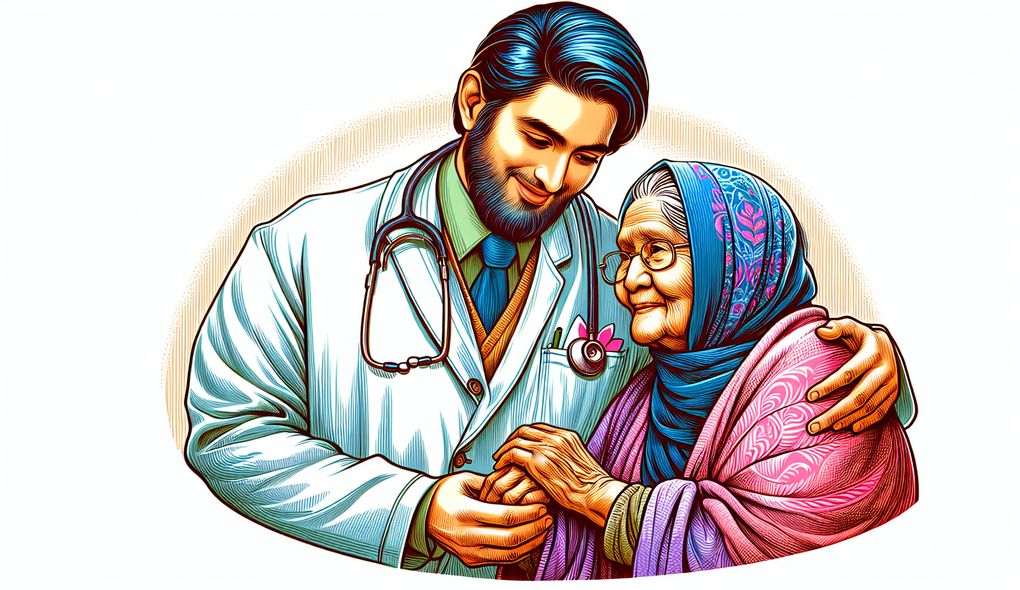How do you approach providing culturally sensitive care to patients from diverse backgrounds?
JUNIOR LEVEL

Sample answer to the question:
When providing culturally sensitive care to patients from diverse backgrounds, I approach it with an open mind, respect, and a willingness to learn. I understand that each patient has their own unique cultural beliefs, values, and practices that may influence their healthcare preferences. I take the time to listen to their concerns and address any cultural considerations that may arise. For example, if a patient follows a specific dietary restriction due to their cultural or religious beliefs, I make sure to accommodate their needs within the limitations of their medical condition. I also ensure that I am knowledgeable about various cultural traditions and customs to better understand and respect the patient's perspective. Overall, my goal is to provide personalized care that respects and integrates each patient's cultural background.
Here is a more solid answer:
In my approach to providing culturally sensitive care, I prioritize effective communication and continuous learning. I understand that effective communication is key to building trust and understanding with patients from diverse backgrounds. I actively listen to their concerns, ask open-ended questions, and encourage them to share their cultural beliefs and practices that may impact their healthcare decisions. By understanding their perspective, I can better tailor care to their unique needs. Additionally, I am committed to continuous learning by staying updated on cultural competence training and actively seeking knowledge about different cultures. For example, I have attended workshops on cultural diversity in healthcare and have volunteered at community events that celebrate various cultural traditions. This allows me to better understand and respect the cultural nuances and preferences of my patients, ensuring that their care is personalized and culturally sensitive.
Why is this a more solid answer?
The solid answer expands on the basic answer by emphasizing effective communication and continuous learning. It includes specific examples such as asking open-ended questions and attending cultural diversity workshops. The answer also highlights the importance of tailoring care to each patient's unique needs. However, it could further improve by providing examples of how the candidate has applied cultural sensitivity in past experiences.
An example of a exceptional answer:
To deliver culturally sensitive care, I approach each patient as an individual with their own set of values and beliefs. I start by creating an open and non-judgmental environment where patients feel comfortable sharing their cultural background and preferences. I use active listening skills to understand their unique needs and perspectives, ensuring that their care aligns with their cultural beliefs. For example, when caring for a patient from a different cultural background, I proactively educate myself on their customs, traditions, and healthcare practices. This allows me to provide appropriate care that respects their cultural values. In one instance, I had a patient who preferred a traditional healing ritual alongside medical treatments. I worked collaboratively with the patient's family and healthcare team to incorporate the ritual into their care plan, ensuring that it was performed in a safe and respectful manner. Going above and beyond, I also advocate for diversity and cultural competence in the healthcare system. I actively participate in diversity committees and engage in cultural sensitivity trainings to promote inclusive and culturally competent care. By fostering a welcoming and respectful environment for patients from diverse backgrounds, I strive to improve health outcomes and patient satisfaction.
Why is this an exceptional answer?
The exceptional answer goes beyond the solid answer by demonstrating a deep understanding of cultural sensitivity. It emphasizes the creation of an open and non-judgmental environment, actively educating oneself on different cultures, and incorporating cultural beliefs into care plans. The answer also showcases the candidate's dedication to advocating for diversity and cultural competence within the healthcare system. It provides a specific example of incorporating a traditional healing ritual into a care plan, showcasing their ability to adapt and tailor care to individual patient needs. Overall, the exceptional answer demonstrates a comprehensive understanding and application of culturally sensitive care.
How to prepare for this question:
- Research different cultures and their healthcare practices to broaden your understanding.
- Attend cultural competence training or workshops to enhance your knowledge and skills.
- Practice active listening and open-mindedness in your interactions with patients.
- Seek opportunities to volunteer or engage with diverse communities to gain firsthand experience.
- Reflect on past experiences where you have provided culturally sensitive care and be prepared to discuss them in detail.
What are interviewers evaluating with this question?
- Communication
- Cultural Sensitivity

